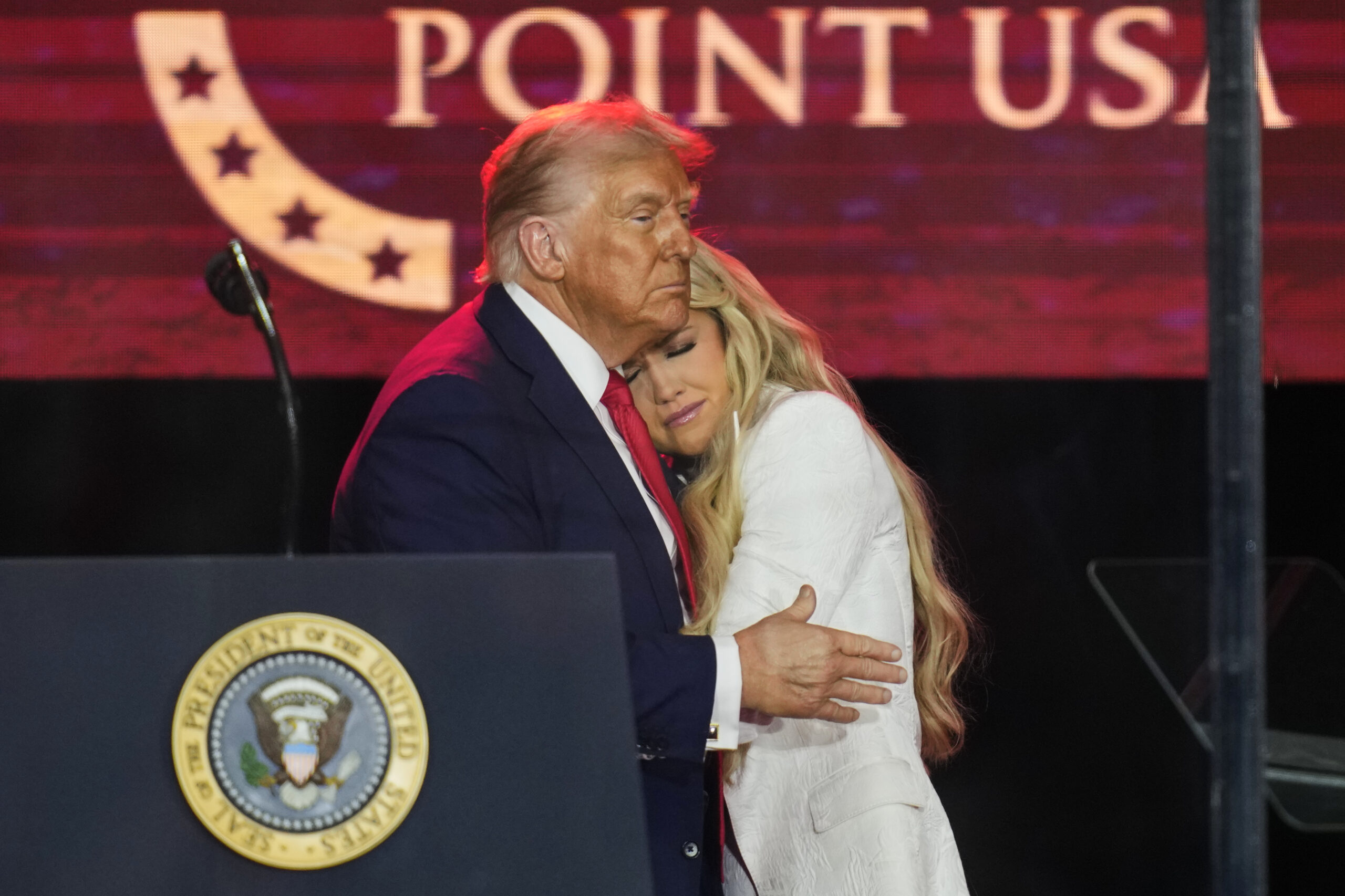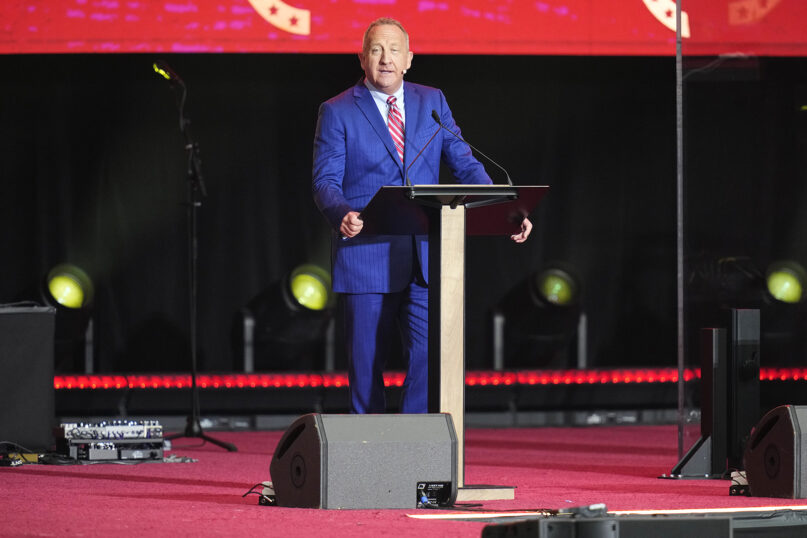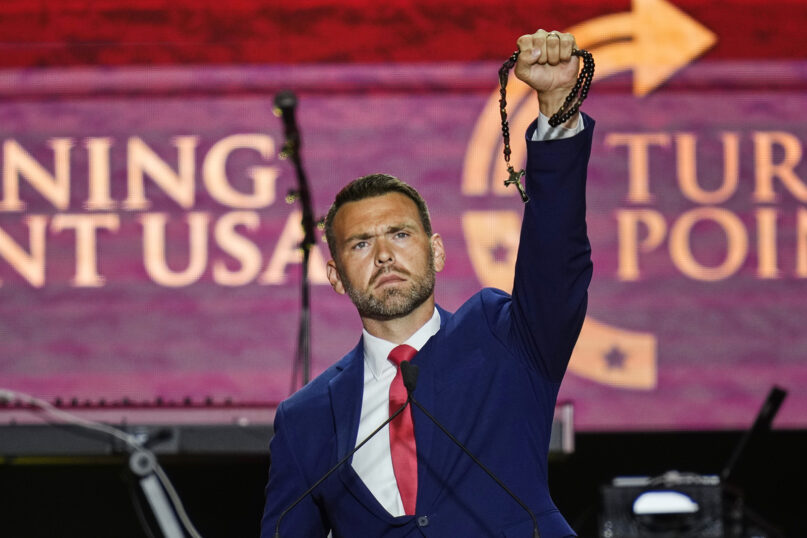
(RNS) — Shortly before the speaking program began at State Farm Stadium in Glendale, Arizona, on Sunday (Sept. 21) to kick off the massive memorial service honoring conservative activist Charlie Kirk, a group of prominent Christian musicians onstage sang a rendition of the hymn “It Is Well With My Soul.”
As the first notes of song filled the space, thousands of attendees silently began to raise four different signs. Two referenced Scripture, and others referenced Turning Point USA, the political organization Kirk founded. The placards were emblazoned with contrasting colors and assigned to different sections of the crowd, with the ultimate effect of transforming the stadium into precise stripes of red, white and blue — the colors of the American flag, two of which hung on either side of the gargantuan stage.
It was the beginning of what quickly became an unapologetic fusion of conservative Christianity — particularly evangelicalism, Kirk’s chosen religious tradition — and President Donald Trump’s style of conservative politics, sometimes delivered by prominent representatives of the United States government. Over the course of roughly five hours, a who’s who of right-wing figures, conservative dignitaries, Trump administration officials and Trump himself regaled a sprawling crowd of tens of thousands with speeches that mixed religious appeals with personal remembrances of Kirk. In many cases, the speeches also included criticism of liberals and progressives, whom some blamed for Kirk’s death even as investigators have yet to determine an explicitly political motive for the shooter.
The event’s religious and political subtext was ubiquitous from the jump, when the Rev. Rob McCoy — the only clergy member to address the crowd from the podium — opened the program. Explaining that Kirk viewed McCoy, the recently retired pastor of Godspeak Calvary Chapel in Thousand Oaks, California, as his personal pastor, McCoy argued Kirk would have wanted Christianity to be a focus of his memorial.
“Charlie wanted his savior to be the guest of honor,” McCoy said. “He wanted all of you to receive this gift from him.”
After adding that Kirk “saw politics as an on-ramp to Jesus,” McCoy shifted into a kind of altar call, urging people in the crowd to stand if they wanted “to receive Jesus as their savior.” The pastor then directed those standing to use a QR code projected on the screen above him to access resources from TPUSA Faith, a project McCoy helped co-found with Kirk, that would “give you everything you need to walk this walk with Christ,” he said.

The Rev. Rob McCoy speaks at a memorial for conservative activist Charlie Kirk, Sunday, Sept. 21, 2025, at State Farm Stadium in Glendale, Ariz. (AP Photo/John Locher)
During the first section of the program, several of Kirk’s former TPUSA co-workers celebrated people they said embraced Christianity as a result of Kirk’s death — a common claim repeated by Kirk’s supporters over the past week.
“Charlie Kirk was a prophet — not the fortunetelling kind that could predict the future, but the biblical kind,” said TPUSA spokesperson Andrew Kolvet, who produced “The Charlie Kirk Show” and regularly appeared on the program alongside Kirk. Kolvet said he now thinks of Kirk’s appearances on college campuses, such as the event in Utah where he was killed, as “tent revivals.”
Faith was also at the center of the address delivered by Erika Kirk, Charlie Kirk’s widow and the newly appointed head of TPUSA. Her emotional address did not avoid politics but contrasted with other speeches by focusing primarily on her relationship with Kirk and pausing to make a powerful point about forgiveness. As tears rolled down her face, Erika, who is Catholic, publicly forgave the man who has been accused of killing her husband earlier this month.
“On the cross, our savior said, ‘Father, forgive them for they not know what they do,’” said Erika Kirk, who wore a cross necklace. “That man, that young man: I forgive him.”

People listen as Erika Kirk, seen on a stadium screen, speaks at a memorial for her late husband conservative activist Charlie Kirk, Sunday, Sept. 21, 2025, at State Farm Stadium in Glendale, Ariz. (AP Photo/John Locher)
Her tone was a departure from speeches that filled other sections of the program, in which references to Christianity were directed outward at ideological enemies on the left or speakers openly encouraged the crowd to go after political opponents.
Vice President JD Vance, a Catholic, said Kirk knew “it is better to be persecuted for your faith than to deny the kingship of Christ,” and Vance suggested that the felled activist — who was known for debating political opponents and casting aspersions on those he disagreed with in ways that have been condemned by some faith leaders in other traditions in recent days — would want his political work to continue.
“I think (Kirk) would encourage me to be honest that evil still walks among us — not to ignore it for the sake of a fake kumbaya moment, but to address it head-on,” said Vance, who has credited Kirk with helping him become Trump’s running mate in 2024, and ultimately vice president.
Vance was also one of at least five speakers who declared Kirk to be a Christian martyr.
“For Charlie, we must remember that he is a hero to the United States of America and he is a martyr for the Christian faith,” Vance said.
Another speaker, conservative activist Benny Johnson, also called Kirk a martyr and compared him to Stephen, the first Christian martyr described in the Bible. Johnson then encouraged political figures in the crowd to go after their political opponents.
“Rulers wield the sword for the protection of good men and for the terror of evil men,” Johnson said, referencing a passage from the biblical Book of Romans. “May we pray that our rulers here, rightfully instituted and given power by our God, wield the sword for the terror for evil men in our nation in Charlie’s memory.”

Jack Posobiec holds up a rosary as he speaks at a memorial for conservative activist Charlie Kirk, Sunday, Sept. 21, 2025, at State Farm Stadium in Glendale, Ariz. (AP Photo/John Locher)
Jack Posobiec, a far-right activist and conspiracy theorist who regularly appeared on Kirk’s podcast, began his speech by walking onstage holding a rosary — something he has done in the past while making controversial comments. He likened Kirk to Moses, saying the activist “brought us to the promised land,” and argued Kirk’s killing will save “Western civilization” by “returning the people to Almighty God.”
Posobiec concluded his message by shouting at the crowd, urging them to engage in “spiritual warfare” on Kirk’s behalf and “put on the full armor of God.”
Posobiec was echoed by Pete Hegseth, the U.S. secretary of war who belongs to a denomination co-founded by Pastor Doug Wilson, a self-described Christian nationalist. Hegseth described Kirk as “a citizen who had the biblical heart of a soldier of the faith, who put on, every single day, the full armor of God with a smile as the Scriptures tell all Christ followers to do.”
Hegseth then said that, in the wake of Kirk’s death, “it’s our turn,” and urged the crowd to “live worthy of Charlie Kirk’s sacrifice, and put Christ at the center of your life, as he advocated for giving his.”
Other speakers included conservative commentator Tucker Carlson, an Episcopalian, who said Kirk was “ultimately a Christian evangelist”; Secretary of State Marco Rubio, a Catholic, who argued Kirk would want attendees at the service to be inspired to embrace Christianity and who then recited a lengthy, paraphrased version of the Apostles’ Creed; and White House deputy chief of staff for policy Stephen Miller, a Jewish man who railed against Trump’s ideological opponents, using a series of conflict metaphors, before declaring “God is on our side.”
Arguably the least religious speech of the day was delivered by Trump, a self-described nondenominational Christian. After walking out to pyrotechnics — a common feature at TPUSA events — while recording artist Lee Greenwood sang “God Bless the U.S.A.,” Trump described Kirk not as a Christian martyr but a martyr for “American freedom.”
Amid the ensuing 45-minute speech, during which Trump appeared to repeatedly deviate from his prepared remarks to discuss topics unrelated to Kirk or his death, the president joked that he struggles with the kind of Christian principles Kirk would want him to embrace, such loving one’s enemies.
“I hate my opponent and I don’t want the best for them,” Trump said. He then turned to Erika Kirk, saying, “I’m sorry, Erika.”
Trump said he agreed with Kirk that the U.S. needed a “spiritual reawakening.” Like many of the speakers, the president envisioned a specific kind of religious revival sparked by Kirk’s killing. Trump — whose administration has been criticized and sued by a broad spectrum of religious groups — appeared to tie a surge of faith to support for his administration’s core policy objectives, namely, its widespread crackdown on immigration and deployment of federal agents and troops into U.S. cities in response to disputed claims of surging crime.
“We have to bring back religion to America because without borders, law and order, and religion, you really don’t have a country anymore,” Trump said, sparking applause. “We want religion brought back to America. We want to bring God back into our beautiful USA like never before.”
